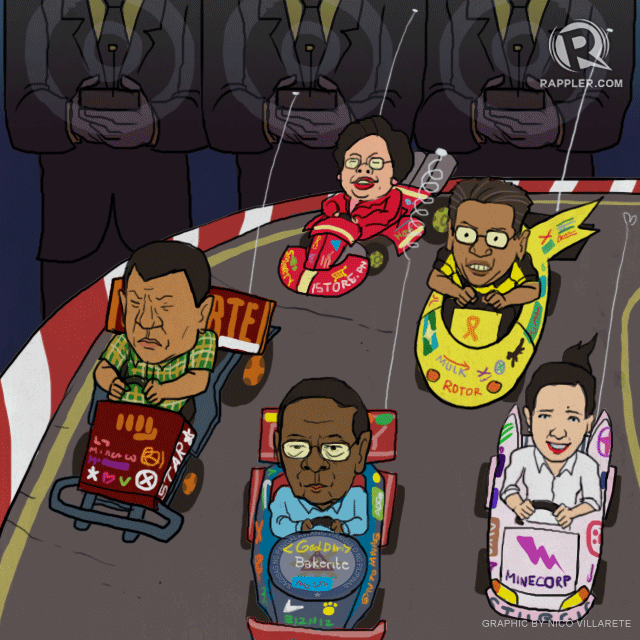SUMMARY
This is AI generated summarization, which may have errors. For context, always refer to the full article.

One question stands out in the hubbub of the election campaign: Who’s paying for the private planes the presidential candidates use?
It is important because this strikes at the heart of the murky world of campaign finance, peopled by rich donors, go-betweens, and the candidates themselves. This question is a catch-all for we can strike out the phrase “private planes” and substitute this with “TV ads” or “mobilization expenses” and a host of other fees.
Here’s how the 4 candidates replied to the question:
- At first, Grace Poe said she would reveal the owners of the planes which she either borrows or leases after elections. When pressed, she later disclosed that the planes are from 2 corporations: San Miguel and Helitrend.
- Manuel “Mar” Roxas II said he pays for the planes he leases from his businessman friend, Eric Gutierrez, who owns a boutique airline company. Roxas’s spokesman, Barry Gutierrez, said they were ready to present the receipts.
- Similar to Poe’s initial answer, Jejomar “Jojo” Binay said he would make the information public after the elections when he files his statement of contributions and expenditures (SOCE) to the Commission on Elections (Comelec).
- Rodrigo Duterte has openly talked about using the private plane of his friend, Davao religious leader Pastor Apollo Quiboloy.
Campaign finance in the Philippines has been poorly regulated by the Comelec.
Candidates typically misreport or under-report expenses because of the unrealistic cap on expenses: P10 per voter for presidential and vice-presidential elections or about a total of about P840 million for the 2016 elections.
Moreover, expenses before the start of the campaign period – we see a lot of political ads on TV – are not considered election expenses.
Generally, it is hard for Comelec, the media and citizens groups to get to the bottom of things. Transparency is not the natural order of things.
Campaign finance operates mainly in a cash economy, where money, packed in bags or small crates, is usually handed in person in select private places. Depositing them in bank accounts would catch the unwanted attention of the Anti-Money Laundering Council.
Big businessmen do not usually want their names disclosed. These billionaires regard their donations as investments, expecting returns should their candidates win.
This makes elite funding of presidential candidates a disturbing reality. A study by the Philippine Center for Investigative Journalism in 2010 showed that only 308 donors funded the campaign for the presidency – out of a total of 50 million registered voters.
Reforms to thwart money politics have been aired by various advocates – from enforcement of laws to transparency in disclosures to public financing of campaigns. We badly need these now. – Rappler.com
Add a comment
How does this make you feel?
There are no comments yet. Add your comment to start the conversation.